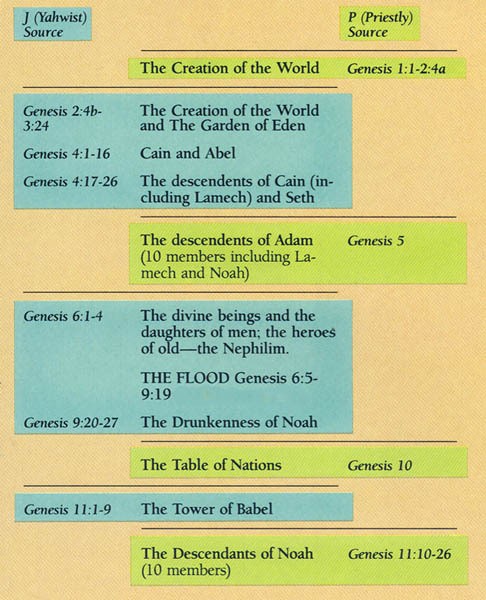The Story - Chapter 1
Chapter 1 - Creation
POP QUIZ!
(And before you ask: yes, this will count toward your final grade.)
Which do you like better:
POP QUIZ!
(And before you ask: yes, this will count toward your final grade.)
Which do you like better:
- Chocolate?
- Peanut butter?
- Reese's Peanut Butter Cup?

I think about Reese's every time I read the beginning of Genesis. Because if you start at the "In the beginning" and read just a few pages in (in the case of The Story: the middle of page 3), you quickly realize that there are two creation stories! If you're like me, you're asking yourself "how can there be two creation stories? If not how, then why are there two creation stories?" Let me give you a quick lesson on what's going on.
The "Documentary Hypothesis" is a scholarly theory that challenges the traditional belief that Moses wrote the first five books of the Bible, known as the Torah. Instead, it suggests that these books were compiled from four primary sources over time, each reflecting the traditions, communities, and historical contexts of ancient Israel:
Yet what this theory does not explain is why there are two creation stories! Scripture just gives us the two creation stories, then moves onto Cain and Abel (page 7 in The Story), Noah and the flood (pages 8-11 in The Story), and the first Covenant (also called the Noahic Covenant, page 11 in The Story). Why is that? While we can take guesses, they are just that: guesses. No one really knows. All we are left with is that those who put together the Torah thought each creation story complemented the other, even if they are profound in their own right as stand alone narratives.
Kind of like chocolate and peanut butter!!
The "Documentary Hypothesis" is a scholarly theory that challenges the traditional belief that Moses wrote the first five books of the Bible, known as the Torah. Instead, it suggests that these books were compiled from four primary sources over time, each reflecting the traditions, communities, and historical contexts of ancient Israel:
- Priestly Source
- Dry, formulaic in style
- Strong interest in genealogies, specific dates, and ritual observances
- Yahwist Source
- Use the name YHWH for the name of God
- God is described in very human terms
- Writes in story form
- Talking animals
- Elohist Source
- Use of the name "Elohim" for God
- Stresses the importance of fearing God
- God is revealed with/in dreams
- Deuteronomic Source
- Book of Deuteronomy (duh!)
- Central theme is the covenant
- Most distinctive commandment is that it forbids sacrifice outside of the central sanctuary
Yet what this theory does not explain is why there are two creation stories! Scripture just gives us the two creation stories, then moves onto Cain and Abel (page 7 in The Story), Noah and the flood (pages 8-11 in The Story), and the first Covenant (also called the Noahic Covenant, page 11 in The Story). Why is that? While we can take guesses, they are just that: guesses. No one really knows. All we are left with is that those who put together the Torah thought each creation story complemented the other, even if they are profound in their own right as stand alone narratives.
Kind of like chocolate and peanut butter!!

What I'd like for those of you who've made it this far in this week's blog: try to answer the questions from Chapter 1 on page 473 in The Story, focusing on the first three questions. After considering those three questions, I want you to answer the following:
Why do you think we have two creation stories in scripture?
I'd love to read your answers to this question!
Regardless of your answer, the essential truths that are proclaimed in both creation accounts are:
Why are there two stories of creation? It is not clear, but God wills it. Enjoy them both...on occasion with a Reese's!
Why do you think we have two creation stories in scripture?
I'd love to read your answers to this question!
Regardless of your answer, the essential truths that are proclaimed in both creation accounts are:
- God created everything gratuitously and out of nothing.
- He did this in an orderly way and in stages.
- It was an act of his pure love and his perfect wisdom. As such, creation manifests order and logic.
- He created everything according to its kind and was involved in every stage of that creation.
- Adam and Eve were created directly and personally by God, not simply emerging from a blind evolutionary process.
- Implicitly, both accounts also affirm what later Scriptures attest: that God continues to sustain his creation through an immanent presence and grace (cf. Col 1:17).
Why are there two stories of creation? It is not clear, but God wills it. Enjoy them both...on occasion with a Reese's!

References:
- https://case.web.baylor.edu/sites/g/files/ecbvkj1551/files/2024-01/documentary_hypothesis_resource_-_week_1.pdf
- https://www.oursundayvisitor.com/why-are-there-two-creation-stories-in-the-bible/#:~:text=The first account (Genesis 1,clay) and conversing with humans.
- https://en.wikipedia.org/wiki/Covenant_(biblical)
Posted in The Story
Recent
Archive
2025
January
2024
August
October
Categories
no categories

No Comments